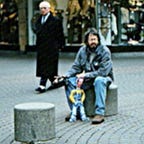Images of Broken Light
After the election of 1980 left me unemployed, I traveled to the nation’s capital in a fruitless search for work (it was not a good year to be a Democrat). Late in the evening of Monday, December 8, sitting on the couch in my friend Tom’s basement apartment on Capitol Hill, I was reading — yes, reading — the new Playboy magazine, which featured an interview with John Lennon and Yoko Ono. I had just finished these words from John –
“…There were a few times when we nearly went under, but we managed to survive and here we are. [Looks upward]. Thank you, thank you, thank you.”
— when startling news came on the television (via Howard Cosell on Monday Night Football) announcing the “unspeakable tragedy” that John Lennon had been shot and killed in New York City. It would have been a shock no matter what, and especially so given that I had him so much on my mind at that very moment.
And it was so sad, in so many ways. He had just turned 40 years old. He had two sons, one just five-years-old. He and Yoko had come out with a well-received new album (after five years in ‘retirement’). He truly was Starting Over.
And now he was gone. So, too, was the “dream” I had, of the Beatles reuniting to catapult modern music over the dying embers of disco into a fresh and creative new realm. I didn’t fully appreciate how punk music was doing some of that, and I didn’t accept the protestations of former Beatles that the band was part of their history, not their future. Suddenly, as John sang, the dream is over, and with it went a slice of our childhood and our innocence.
The next day, or Wednesday (I can’t be sure), on the way back from Washington to my hometown of Wallingford, Connecticut, I decided to see the scene of this horrific crime, so I drove into Manhattan and eastbound on West 72nd Street, past the Dakota, past the entrance where John was assassinated, through throngs of people who had come to mourn.
I saw the flowers, the photographs, the notes and other memorabilia lining the gates in front of the imposing, historic building. It was a surreal snapshot of a generation’s collective emotional outburst. And that emotion was given an opportunity for a fuller venting a few days later, when Yoko asked everyone who wished to honor John to “participate from wherever you are” and observe ten minutes of silence on Sunday, December 14th.
Two friends and I traveled by commuter train from Connecticut to join hundreds of thousands of other mourners in Central Park that day (where I took the photographs illustrating this story). We gathered around the Naumburg Bandshell, where the likes of John Philip Sousa, Benny Goodman, Duke Ellington, Irving Berlin, Leonard Bernstein and the Grateful Dead had performed over the decades. On stage on this day was a simple, stirring and solitary photograph of John, taken by Bob Gruen — the one with his bare arms crossed in front of him, wearing sunglasses and a $5 New York City T-shirt.
His music played from speakers: In My Life, Watching the Wheels, All You Need Is Love. And then the sounds of ten minutes of silence, just as Yoko requested. We quietly filed out of the park, and took the train home, confronting a new decade with one of our idols gone forever. But as John said in that same Playboy interview I was reading that tragic Monday night:
If the Beatles or the Sixties had a message, it was to learn to swim. Period. And once you learn to swim, swim. The people who are hung up on the Beatles’ and the Sixties’ dream missed the whole point when the Beatles’ and the Sixties’ dream became the point. Carrying the Beatles’ or the Sixties’ dream around all your life is like carrying the Second World War and Glenn Miller around. That’s not to say you can’t enjoy Glenn Miller or the Beatles, but to live in that dream is the twilight zone. It’s not living now. It’s an illusion.
The Ballad of John ended on a jarring, discordant note that shattered the illusion. But not faith in the power of music or, in my belief at least, that above us is more than sky.
For “the physical world is one little bit of the universe,” as his bandmate George Harrison once said. And here we are, we who managed to survive, saying, “thank you, thank you, thank you,” and praying that pools of sorrow do yield to waves of joy, across our universe.
